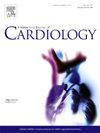Non-vitamin K antagonist oral anticoagulants (NOACs) and risk of spontaneous intracranial hemorrhage in patients with ischemic stroke: An analysis using Taiwan's National Health Insurance Research Database
IF 3.2
2区 医学
Q2 CARDIAC & CARDIOVASCULAR SYSTEMS
引用次数: 0
Abstract
Background
The impact of non-vitamin K antagonist oral anticoagulants (NOACs) on the treatment of ischemic stroke remains unclear. This study aimed to compare the risk of spontaneous intracranial hemorrhage (sICH) in ischemic stroke patients using different NOACs versus warfarin.
Methods
We conducted a retrospective cohort study using Taiwan's National Health Insurance Research Database from 2011 to 2019. Adults with ischemic stroke and no prior sICH or gastrointestinal (GI) bleeding before anticoagulant initiation were included. Patients were grouped by anticoagulant type. Outcomes included sICH, GI bleeding, in-hospital mortality, and all-cause mortality. Adjusted hazard ratios (aHRs) and odds ratios (aORs) were estimated using Cox and logistic regression models, respectively.
Results
Among 3783 patients, those using dabigatran or edoxaban alone, or in combination with other NOACs, had a reduced risk of in-hospital mortality (aOR = 0.52, 0.52, and 0.57, respectively). Patients using rivaroxaban or apixaban alone had a lower risk of gastrointestinal bleeding (aHR = 0.68 and 0.64, respectively). Patients using rivaroxaban, dabigatran, or edoxaban alone, or in combination, had a lower risk of all-cause mortality (aHR = 0.78, 0.54, 0.49, and 0.51, respectively). In contrast, patients using apixaban alone or in combination with other NOACs had a higher risk of sICH (aHR = 1.38 and 2.12, respectively). Short-term NOAC use (≤30 days) was associated with increased sICH risk, whereas long-term use (>90 days) of rivaroxaban, dabigatran, or apixaban was associated with a reduced risk.
Conclusion
Appropriate selection and long-term use (over 90 days) of NOACs for ischemic stroke patients may improve outcomes.
背景:非维生素K拮抗剂口服抗凝剂(NOACs)对缺血性卒中治疗的影响尚不清楚。本研究旨在比较使用不同NOACs和华法林的缺血性脑卒中患者自发性颅内出血(sICH)的风险。方法:采用2011 - 2019年台湾全民健康保险研究数据库进行回顾性队列研究。成人缺血性卒中,在抗凝治疗开始前没有脑出血或胃肠道(GI)出血。患者按抗凝类型分组。结果包括sICH、胃肠道出血、住院死亡率和全因死亡率。分别使用Cox和logistic回归模型估计校正风险比(aHRs)和优势比(aORs)。结果:在3783例患者中,单独使用达比加群或依多沙班或与其他noac联合使用的患者住院死亡风险降低(aOR = 分别为0.52、0.52和0.57)。单独使用利伐沙班或阿哌沙班的患者发生胃肠道出血的风险较低(aHR = ,分别为0.68和0.64)。单独或联合使用利伐沙班、达比加群或依多沙班的患者全因死亡风险较低(aHR = 分别为0.78、0.54、0.49和0.51)。相比之下,单独使用阿哌沙班或联合使用其他noac的患者发生sICH的风险更高(aHR = 分别为1.38和2.12)。短期使用NOAC(≤30 天)与sICH风险增加相关,而长期使用利伐沙班、达比加群或阿哌沙班(bb0 90 天)与风险降低相关。结论:缺血性脑卒中患者适当选择并长期使用NOACs(≥90 天)可改善预后。
本文章由计算机程序翻译,如有差异,请以英文原文为准。
求助全文
约1分钟内获得全文
求助全文
来源期刊

International journal of cardiology
医学-心血管系统
CiteScore
6.80
自引率
5.70%
发文量
758
审稿时长
44 days
期刊介绍:
The International Journal of Cardiology is devoted to cardiology in the broadest sense. Both basic research and clinical papers can be submitted. The journal serves the interest of both practicing clinicians and researchers.
In addition to original papers, we are launching a range of new manuscript types, including Consensus and Position Papers, Systematic Reviews, Meta-analyses, and Short communications. Case reports are no longer acceptable. Controversial techniques, issues on health policy and social medicine are discussed and serve as useful tools for encouraging debate.
 求助内容:
求助内容: 应助结果提醒方式:
应助结果提醒方式:


